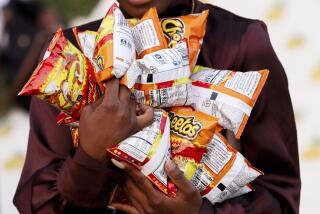Food additives are linked to hyperactivity in preschoolers
- Share via
Proponents of natural foods have long suspected that artificial colorings and preservatives may be unhealthful. Now British researchers have found that the additives can drive hyperactive behavior in preschool children.
In a monthlong study, child health specialists from the University of Southampton divided 277 3-year-olds into four groups: children with hyperactivity and skin allergies, children with skin allergies but no hyperactivity, children with hyperactivity but no skin allergies and children with neither condition.
During the first week, all youngsters ate foods free of such yellow dyes as tartrazine and sunset yellow, red dyes carmoisine and ponceau and the preservative sodium benzoate. Kids were randomly assigned in the second through fourth weeks to drink 10 ounces of fruit juice daily with or without 20 milligrams of colorings and 45 milligrams of preservatives.
Across the board, parents rated their children significantly less hyperactive when they weren’t consuming the additives and more hyperactive when the chemicals were put back. Because this occurred even in kids who weren’t considered hyperactive or allergic before the study, the authors suggested that all children could benefit from elimination of the additives.
The study appears in the June issue of the Archives of Disease in Childhood.
*
Jane E. Allen






